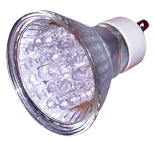
With energy prices hiking rapidly in 2022, there's no denying that we're all looking to cut our gas and electric bill costs as much as possible. A typical household in Great Britain will, on average, pay around £2500 a year for their energy bill from October 2022.
In light of the Global Energy Crisis, we've spoken to our most trusty electricians, who have passed on their top tips for cutting electric bills especially for you.
More...
Although the general public are becoming more aware of the benefits of using LED lighting in their homes, adoption is still notably slow says a recent survey from Lamp Shop Online.
 LED lighting has already proven itself to be a money saver, saving homeowners as little as £13.63 on their annual lighting bill. With the average household energy bill around £1,420 a year and 8% of that going on lighting every little helps. Even the business world can get a significant saving! A small office with only a handful of fluorescent tubes can save around £85.50 a year by switching to LED tubes, and this figure only goes up as the building gets larger.
LED lighting has already proven itself to be a money saver, saving homeowners as little as £13.63 on their annual lighting bill. With the average household energy bill around £1,420 a year and 8% of that going on lighting every little helps. Even the business world can get a significant saving! A small office with only a handful of fluorescent tubes can save around £85.50 a year by switching to LED tubes, and this figure only goes up as the building gets larger.
However these reductions still don't seem like enough to get homeowners to see the light. Lamp Shop Online's survey found that although 72% of consumers know that LED lighting can be used in the home and 67% know they will reduce their energy bills, many still don’t know how to take the first step to install LED lighting as they are confused over what to search for online. Getting more information on what they need to do to make the switchover is clearly still the biggest obstacle, with 39% of respondents not sure what to put into a search engine to get the relevant results.
28% didn't even know that LED lighting could be used in the home at all, so a lack of information is also a large factor at work.
Neil Kennedy from Lamp Shop Online said he was "surprised" that consumers didn't know where to begin looking for the information available. "This survey shows there is a definite lack of practical information on purchase and installation and concrete statistics on the savings LEDs can offer. Simply put, the lighting industry is not making it easy for consumers to make the switch to LEDs," he said.
He went on to say that creating the survey was a demonstration of their committment to LED lighting, and would now use these results to help encourage more people to read up on and eventually adopt LED products.
More information can be found at www.lampshoponline.com
Via Electrical Contracting News
- Mark Jenkins
-----
Mark Jenkins is the Electrical Course Development Manager here at Access Training. If you would like to take the steps to become a professional electrician, our electrical training courses are the fastest and most effective way to build up the skills you need and gain the necessary qualifications for a prosperous career in the industry. To find out more give us a call on 0800 345 7492.
Is your electricity bill made up of “hidden” charges? Well an energy expert seems to think so.
Energy suppliers and brokers have been challenged by energy expert, David Hunter, from global energy management company, Schneider Electric, to be open about these hidden costs. Unknown levels of commissions to energy brokers and price comparison websites are contributing to higher energy bill costs for householders and industry.
Speaking on BBC1’s Breakfast programme, Hunter said, that we are facing increasing energy bill announcements but weren’t being given full visibility of how the costs are made up. Asked to explain whether bill increases were justified, and what the reasons were behind the increases, Hunter said there was not enough competition in the market, and although we shouldn’t let the suppliers off the hook, increasing costs of green subsidies, energy efficiency schemes and rewiring Britain were adding more to bills at the moment than wholesale costs.
However, he further explained that an unknown portion of the "suppliers’ costs" on the bill is paid in the form of commission to energy brokers and price comparison websites. While these companies provide a valuable service, Hunter said, "One thing we don’t see broken down in the figures is how much money goes in hidden commission from the suppliers to those websites, and I think that would be interesting to see."
He added, "At a time when rising bills are placing real pressure on the cost of living, and also increasing the costs of British industry doing business, it has never been more important that all aspects of the bill are made transparent. From supplier/producer profits to green policy costs and broker commissions, all charges should be open and scrutinised so that homes and businesses don’t pay a penny more than they need to, just to keep the lights on.
"As a start, I call today on both suppliers and brokers to clearly state the amount of hidden commission included on energy bills, and would ask customers whether they are prepared to put up with secret third party costs at a time when bills are shooting up."
-----
Mark Jenkins is the Electrical Course Development Manager here at Access Training. If you would like to learn more about electrical work and maintenance, you might want to consider one of the many electrical training courses we offer. These are available for both DIY enthusiasts AND people looking to gain the vital qualifications needed to make the career change to become an electrician. To find out more give us a call on 0800 345 7492.
Just over a month after the announcement that the start of the Renewable Heat Incentive would be delayed until Spring 2014, the UK Government has also delayed the introduction of proposed "smart meters" to 30 million homes until Autumn 2015.
The £11.7 billion project has been considered vital to getting householders to cut their energy use as the country faces having to import more energy in the future. These smart meters record consumption of gas and electricity in hourly intervals, regularly communicating the information back to the utility provider for monitoring and billing purposes. While the project is set to start in 2015, its estimated that the move to install these into every home won't be completed until 2020.
Angela Knight, chief executive of Energy UK, noted that installing these meters is going to be a "complex task" and this delay will allow the changeover to happen more efficiently. She said: "We welcome the government's prudent decision to allow an additional 12 months to complete the smart meter programme. This recognises the scale of the programme and the need to prepare carefully."
Energy Secretary Ed Davey added: "Completing the national rollout will be an enormous logistical and technical challenge for the industry. Getting this right for consumers is the government's priority."
However the Government will be taking measures to speed up the introduction despite delays. From the end of 2013, when a customer switches from a supplier who has provided them with a smart meter, the new supplier has to either rent the previous supplier’s meter or install their own smart meter, helping to gradually phase out old equipment. This also makes sure that suppliers don’t lose out when they become early adopters. There are also proposals to require energy suppliers and network operators to comply with the Smart Energy Code and ensure their smart meters really perform their advanced functions and supply data to customers.
Further reading: http://www.bbc.co.uk/news/business-22480068
http://www.techweekeurope.co.uk/news/smart-meter-roll-out-delayed-until-autumn-2015-116011
http://www.ft.com/cms/s/0/70d66e86-b97b-11e2-bc57-00144feabdc0.html#axzz2TFaAEogR
In these days of high energy prices we are all looking for ways to save a few pounds on our electricity bills. I think I may have a way of achieving this saving -get your teenagers to move out of the family home!
A teenagers bedroom consumes large amounts of electricity, TV’s, games consoles, music systems, mobile phone chargers, lights, computers etc. all on at the same time and left on when not in use. Sounds familiar? Over a period of a year (multiplied by the number of teenagers in the home) equates to a large amount of energy being wasted.
We can try to educate them, but to no avail, they don’t listen or is it that they don’t understand? A friend noticed a vast difference in his energy bills once his teenager ‘flew’ the nest to go to university. He calculated that he was saving £10 a month on his electricity bill alone, that’s an annual saving of £120. It may not seem a vast amount of money but it’s a saving that has allowed him and his wife to start a new hobby together, allowing them to have ‘more’ quality time with each other.
He is also making savings on his heating costs as windows are not being left open for the heat to escape and the heating isn’t being left on when no one is in the house! Is the way to save money on energy bills as simple as getting the teenagers to move out? From where I’m sat it looks like a viable answer.
“You can’t do that!” I hear some of you scream. You could try putting timer switches on the sockets, so devices are not left on unnecessary. You could use lamps that are more energy efficient or of a small wattage. These are little things that could make a difference to your wallet at the end of each month.
- Mark Jenkins